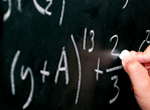My daughter who is in the fifth grade asked me recently to teach her how to multiply using long multiplication. She said her math teacher felt she was now ready to learn this "traditional method."
For the past year or so, my daughter has been instructed to multiply numbers using only the "box method," which she had to teach to me, since I only learned to multiply using the "traditional method" in the (very) early 1960's.
By happenstance, on the day of my daughter's request there also appeared an editorial in the Washington Post by Professor G.V. Ramanathan, professor emeritus of mathematics, statistics and computer science at the University of Illinois at Chicago asking the question, "How much math do we really need?"
In the editorial, Professor Ramanathan writes about the 27th anniversary of the report, A Nation At Risk. That report lamented the poor state of education in the US, and recommended, among other things,
"The teaching of mathematics in high school should equip graduates to: (a) understand geometric and algebraic concepts; (b) understand elementary probability and statistics; (c) apply mathematics in everyday situations; and (d) estimate, approximate, measure, and test the accuracy of their calculations. In addition to the traditional sequence of studies available for college-bound students, new, equally demanding mathematics curricula need to be developed for those who do not plan to continue their formal education immediately."
That recommendation, Professor Ramanathan said, "offered tremendous opportunities to universities and colleges to create and sell mathematics education programs." As a result, mathematics has been positioned much as "the marketing of creams to whiten teeth, gels to grow hair and regimens to build a beautiful body," he writes.
The marketing of mathematics may have been impressive over the past 30 years or so, but what has it actually achieved, he asks?
Not much, he contends.
Professor Ramanathan cites a 2008 review by the US Department of Education on the 25th anniversary of the Nation at Risk report titled, "A Nation Accountable," (PDF here) that "found that the nation is at 'greater risk now' than it was in 1983, and the National Assessment of Educational Progress math scores for 17 year olds have remained stagnant since the 1980s."
This sounds bad, but Professor Ramanathan asks, is it really?
"How much math do you really need in everyday life? Ask yourself that and also the next 10 people you meet, say, your plumber, your lawyer, your grocer, your mechanic, your physician or even a math teacher."
Professor Ramanathan contends that:
"Unlike literature, history, politics and music, math has little relevance to everyday life."
Furthermore, Professor Ramanathan writes that the study of mathematics in courses such as Quantitative Reasoning is largely "an unsubstantiated myth."
In fact, he writes:
"All the mathematics one needs in real life can be learned in early years without much fuss."
I must confess that I believe in the "unsubstantiated myth" that understanding mathematics, especially more advanced mathematics, helps your reasoning powers, but I grew up in an engineering family and also pursued engineering as a career, so I am more than a bit biased. It is also, I admit, something I tell my daughters fairly regularly whenever they grumble about doing their math homework, which is what my father and grandfather basically told me as well growing up.
Needless to say, Professor Ramanathan high-profile editorial has caused a fuss, at least if you look at the editorial's comments at the Washington Post's web site.
It no doubt has given a bit of heartburn to the Science, Technology, Engineering, and Mathematics (STEM) Education Coalition. Mathematics is seen as the core discipline of STEM, and there has been a push for "major changes in the training of teachers in the mathematics to be taught in primary schools" as part of the STEM effort.
In addition, as this editorial last week in the New York Times notes, the National Academies have been calling for the past several years for improvements in "the quality of math and science education, at all levels, or the US will lose economic ground to foreign competitors."
In light of the above and your own personal experiences, the question is whether Professor Ramanathan is correct in his assessment of the effectiveness of current mathematics education and its usefulness in everyday life, or, as one comment at the Post put it, did Professor Ramanathan happen to wake up on the wrong side of the bed went he wrote the editorial?
Now be fair, and read Professor Ramanathan's editorial completely, not just my synopsis, before commenting on the effectiveness of math education in schools as well as on how much mathematics is "enough"?
Robert N. Charette is a Contributing Editor to IEEE Spectrum and an acknowledged international authority on information technology and systems risk management. A self-described “risk ecologist,” he is interested in the intersections of business, political, technological, and societal risks. Charette is an award-winning author of multiple books and numerous articles on the subjects of risk management, project and program management, innovation, and entrepreneurship. A Life Senior Member of the IEEE, Charette was a recipient of the IEEE Computer Society’s Golden Core Award in 2008.



